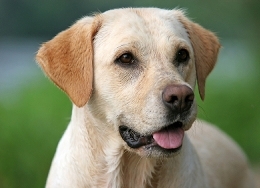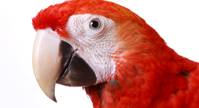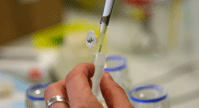Progressive Retinal Atrophy or PRA-prcd
Description:
Progressive Rod-Cone Degeneration, or PRA-prcd, is a form of Progressive Retinal Atrophy (PRA) in which the cells in the dog's retina degenerate and die. PRA for dogs is similar to retinitis pigmentosa in humans. Most affected dogs will not show signs of vision loss until 3-5 years of age. Complete blindness can occur in older dogs. Progressive Rod-Cone Degeneration is a form of PRA known to affect over 40 different breeds.
The retina is a membrane located in the back of the eye that contains two types of photoreceptor cells. These cells take light coming into the eyes and relay it back to the brain as electrical impulses. These impulses are interpreted by the brain to "create" images. In dogs suffering from PRA-prcd, the photoreceptors begin to degenerate, causing an inability to interpret changes in light. This results in a loss of vision. Rod cells, which normally function in low-light or nighttime conditions, begin to degenerate first. This leads to night-blindness. The cone cells, which normally function in bright-light or daytime conditions, will deteriorate next. This often leads to complete blindness over a period of time.
PRA-prcd is inherited as an autosomal recessive disorder. A dog must have two copies of the mutated gene to be affected by PRA. A dog can have one copy of the mutation and not experience any symptoms of the disease. Dogs with one copy of the mutation are known as carriers, meaning that they can pass on the mutation to their offspring. If they breed with another carrier, there is a 25% chance that the offspring can inherit one copy of the mutated gene from each parent, and be affected by the disease.
Acceptable Sample Types:
Animal Genetics accepts buccal swab, blood, and dewclaw samples for testing. Complimentary sample collection kits are available and can be ordered at test now.
This Test Is Relevant For the Following Breeds:
|
|
|
|
|
|
|
|
|
|
|
|
|
|
|
|
|
|
|
|
|
|
|
|
|
|
|
|
|
|
|
|
|
|
|
|
|
|
|
|
|
|
|
|
Results:
Animal Genetics offers DNA testing for Progressive Retinal Atrophy or PRA-prcd. The genetic test verifies the presence of the PRA-prcd mutated gene and presents results as one of the following:
| p/p | Affected | The dog carries two copies of the mutant gene and is homozygous for PRA-prcd. The dog is affected, and will always pass a copy of the mutated gene to its offspring. |
| n/p | Carrier | Both the normal and mutant copies of the gene were detected. Dog is a carrier for the PRA-prcd mutation, and can pass on a copy of the defective gene to its offspring 50% of the time. |
| n/n | Clear | Dog tested negative for the PRA-prcd gene mutation, and will not pass on the defective gene to its offspring. |
Submit a Sample for Testing:
To submit a sample for testing please go to test now.
To order a sample collection kit please go to order sample collection kits.
Cost per sample is $45.00. Please see our Canine Fee Schedule for all test rates.










